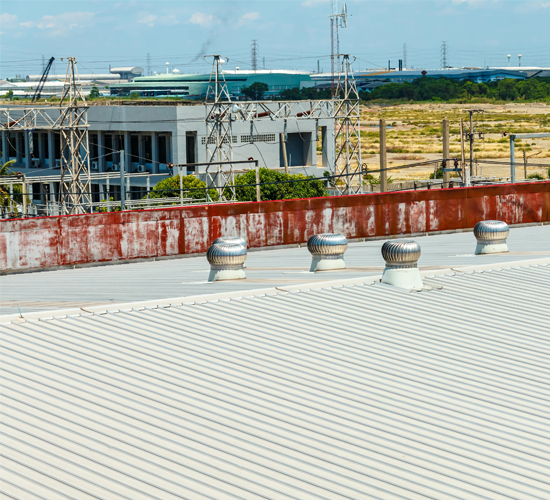Commercial Roofing Gainesville, FL Reliable Roofers, Quality Roofing Services
A tough and durable commercial roof will not only protect the occupants of your building and your assets, but it will also help attract potential customers into your business. You’ll have to ensure that your roof is made from high-quality materials to withstand inclement weather.
As a professional roofing contractor in Gainesville, Florida, we’ll guide you in choosing the best roofing materials to use and how to install them to get your property ready for anything. Our expert roofers have been dealing with mother nature’s unpredictable behaviors for many years.
We provide customized roofing services to commercial property owners. If you need professional assistance on roof installation, roof repair, and roof replacement, we’re here to help! When you have a proper roof for your business, you’ll be able to reduce your energy consumption and your energy bills as well.

Commercial Roofing Materials
Also called the polyvinyl chloride and is commonly used as a commercial roofing material. It has two layers made of PVC material and a polyester reinforcement in between those two layers. This material is more affordable than TPO. However, both have the same durability and protection from outside elements, and they’re worth the money.
TPO is also known as thermoplastic polyolefin material, which is a single-ply material. Buildings with flat or low-sloped roofs go perfectly well with this type of roofing material. TPO is made up of a single layer of synthetics and reinforced scrim.
On the other hand, TPO is very much resistant to extreme weather and freezing temperatures. With the proper maintenance, TPO roofs can last for up to 30 years or more. Not only are they resistant to punctures, but they’re also resistant to abrasions.
Aside from residential properties, metal roofs are also perfect for commercial buildings because of its durability. They can resist fire and harsh weather and provide excellent insulation. You’ll be able to save money, reduce your energy consumption as well as reduce your energy bill.
You can choose from a wide variety of colors, shapes, and sizes. Since metal roofs are lightweight, installation is easier than most commercial roofing materials.
Cleaning and maintenance are easy as well. However, metal roofs are pricier when compared to other commercial roofing materials. Metal roofs may contract and expand with poor roof installation.
BUR roofing is exceptionally durable, and it can withstand heavy foot traffic. You can trust that this material will remain intact even during freezing temperatures which usually causes cracks or brittleness. Polyester and fiberglass reinforcement are the main components of BUR material.
It is also resistant to tears and UV rays, and it is energy-efficient and will help reduce your energy bills. Built-up roofs or BUR is composed of bitumen and alternating layers of reinforced fabric for durability.
The most common finishing material for BUR roofing includes adding a top layer of aggregates. The downside of using BUR consists of the slow installation process and the risk of being exposed to vapors and fumes that are hazardous.
Another popular commercial roofing material is modified bitumen. It is highly durable in withstanding any harsh weather, as well as fire, water, and impact. This material can last for 20 years or more with proper maintenance.
Modified bitumen can be installed in different ways through asphalt, adhesives, or torch methods. However, modified bitumen can be damaged very easily by heavy foot traffic when compared to built-up roofing, but modified bitumen is easy to repair. Modified bitumen is still an excellent commercial roofing material.
Roof coating adds another layer of protection for your existing roofing material. Roof coating also helps extend the lifespan of your roof. Roof coating is typically applied as a liquid and later solidifies to form a protective layer.
The most common roof coating materials include asphalt, acrylic, silicone, and polyurethane coating. A roof coating will prevent water from seeping into your roofing system.


